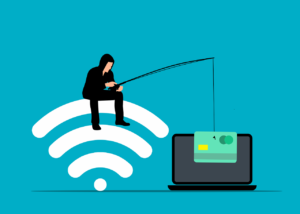Phishing frauds are still a prevalent threat in today’s digital landscape. In 2024 alone, estimates suggest billions of spam emails are sent daily, and cybercriminals are constantly refining their tactics. This makes it more crucial than ever to be vigilant and recognize the telltale signs of a phishing attempt.
This article equips you with five key strategies to find and avoid phishing frauds in 2024:
Scrutinize Sender Information:
Phishing emails often try to impersonate legitimate sources like banks, credit card companies, or even familiar colleagues. Here’s how to spot red flags:
- Mismatched Email Addresses: Check the sender’s email address carefully. Does it look like a legitimate company’s address but with a typo or extra character? For instance, “[email address removed]” might be spoofed as “[email address removed]” or “[email address removed].”
- Generic Greetings: Phishing emails often use generic greetings like “Dear Customer” or “Dear User.” Legitimate companies typically address you by name if they have it on record.
- Suspicious Domain Names: Hover over the sender’s name to see the actual email address. Does the domain name (the part after the @ symbol) match the company it claims to be from?
Beware of Urgency and Threats:
Phishing emails often try to create a sense of urgency or panic to pressure you into acting quickly without thinking critically. Common tactics include:
- Limited Time Offers: Emails claiming you must “act now” or your account will be suspended are likely scams. Legitimate companies typically provide ample notice for important actions.
- Threats of Account Closure: Phishing emails might threaten to close your account if you don’t “verify” your information immediately. Don’t be fooled!
Inspect Suspicious Links and Attachments:
Phishing emails often have links or attachments designed to steal your personal information or infect your device with malware. Here’s how to stay safe:
- Don’t Click Unfamiliar Links: Never click on links within an email unless you’re certain of the sender’s legitimacy. Hover over the link to see the actual URL it directs you to. Does it look suspicious?
- Don’t Download Unknown Attachments: Phishing emails might have attachments disguised as legitimate documents. Avoid downloading attachments from unknown senders.
Be Wary of Requests for Personal Information:
Legitimate companies rarely request sensitive information like passwords or Social Security numbers via email. Here’s what to watch out for:
- Requests for Login Credentials: Never share your login information via email, even if the email appears to be from a bank or another trusted company.
- Suspicious Forms and Surveys: Phishing emails might have embedded forms or links to surveys requesting personal information. Don’t provide such information unless you’re confident about the sender.
When in Doubt, Verify and Report:
If you’re unsure about an email’s legitimacy, it’s always best to err on caution. Here are two steps to take:
- Verify with the Source: Contact the company the email claims to be from directly (using a phone number or website you know is legitimate) to confirm the email’s authenticity.
- Report Phishing Attempts: Report suspicious emails to the proper authorities. Many email providers offer options for reporting phishing attempts directly within their platforms. You can also report phishing fraud to the Federal Trade Commission (FTC).
Staying Ahead of Phishing Threats
Incorporating these five strategies into your daily email routine can significantly increase your ability to find and avoid phishing attempts. Remember, cybercriminals constantly adapt their tactics, so staying informed is crucial. Resources like the Anti-Phishing Working Group offer valuable insights into current phishing trends.
Furthermore, consider partnering with a reliable IT (Information Technology) service provider like Virtual IT Group for comprehensive cybersecurity solutions tailored to your specific needs. Our team of experts can help implement advanced anti-phishing measures and provide ongoing education for your employees to further bolster your organization’s cybersecurity posture.


